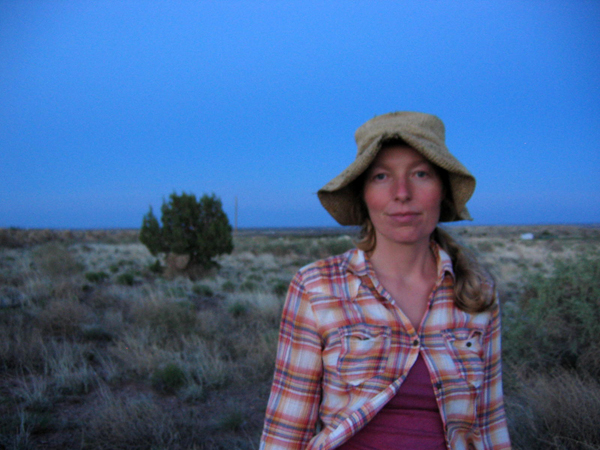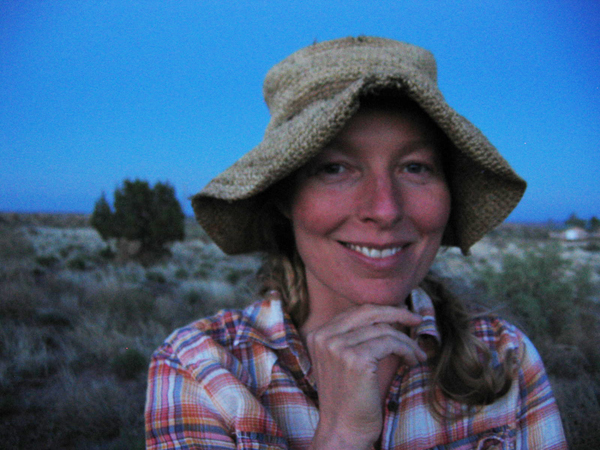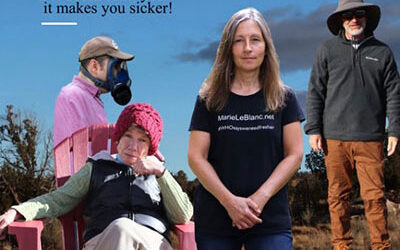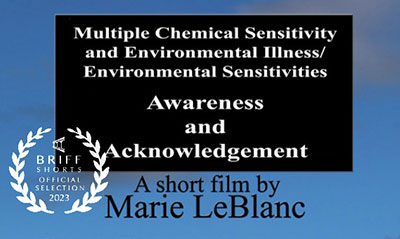by Julie Genser

Thilde Jensen visits the chemically and electrically sensitive
community in Snowflake, Arizona. © Julie Genser
Thilde Jensen is an extremely likable 39-year-old Danish woman. Her broad cheekbones and piercing blue eyes hold your attention easily. Soft-spoken but not shy, she’s the kind of person that enters effortlessly into engaging conversation with just about anyone, and makes you feel listened to; heard. She cries easily when you share of your pain or past trauma. It’s this compassionate nature and ability to converse with just about anyone that makes her such a good photojournalist. And those were the conditions I met her under; as a photojournalist traveling across country to document how people with severe chemical and electrical sensitivities are living. She was only able to make the trip because she recovered 80% of her health after suffering from severe chemical and electrical sensitivities herself for the past eight years. And it only took a couple days of Annie Hopper’s Dynamic Neural Retraining System™ (DNRS™) workshop for her to experience a big shift that would completely turn her life around. This is her story.
Born in Denmark in the early ’70s, Thilde had a fairly “normal” childhood. She came to New York City to study photography at the School of Visual Arts when she was 25. For work, she printed in the darkroom for other photographers and did some editorial work for prestigious magazines such as Newsweek and Details.
And then 9/11 happened.
At the time, Thilde was living in Brooklyn with her husband, right next to the Brooklyn Queens Expressway (BQE). Dump trucks spewing black exhaust would sit idling right outside her apartment. She began having chronic sinus and ear infections, which led her to quit her job and start juicing, eating healthier and living a generally healthier, less stressful lifestyle. It worked; she started to feel healthy again. So she went back to working in the darkroom. But work was slow and after 9/11 it became more and more difficult to find work. The stress of not working coupled with the stress of 9/11 took its toll.
About a year after 9/11, the apartment below hers was renovated. They lacquered the floor without ventilating. Thilde woke up feeling drunk and felt that way for the next month without relief. She started having problems being around car exhaust. Like others on the fast road to severe chemical sensitivity, she tried alternative treatments to try to manage her increasing symptoms. After doing acupuncture sessions three times a week for a month or two she was able to be around traffic again.
Then the Iraq War started, which was very traumatic for her. She started sensitizing to everything in her environment. First it was car exhaust and books. Then cigarette smoke and perfume.
She decided to move to Syracuse, NY to study Environmental Science. It meant living separate from her husband, who had to remain in NYC for work. But they were willing to work through the challenges. Somehow Thilde managed to begin the program and take classes, even with all the environmental sensitivities she was developing. Then, ignorant to the dangers of pesticide, she applied a flea killer to her cats and ended up losing everything. She had to send her cats back to her husband in NYC. Things got so bad, at times she was catatonic, unable to care for herself. She realized that she would have to return to Denmark in order to apply for disability benefits.

Thilde at dusk. © Julie Genser
Her diagnosing physician in Denmark told her she had the worst case of environmental illness he had ever seen. She returned to America, moving to Tucson to survive through the winter. Her marriage had fallen apart and she had become electrically sensitive and could no longer drive a car, be on the phone, watch T.V., or use the computer.
Thilde lived in Tucson for a while then returned to upstate New York to check out an ecovillage. She ended up moving there and still lives there today. Her community is spread out so each resident has a lot of space and privacy, and the members agreed to live fragrance free for her and a couple other chemically sensitive residents. She had a fairly comfortable life there, only wearing her big respirator mask when she had to interact with the public, like for shopping or to access health care.
Thilde lived in this ecovillage for five years before she heard about the DNRS™ workshop. An MCS friend of hers had read about Annie Hopper on Planet Thrive, and immediately called her to tell her about it. Thilde had heard about recoveries of people who had done faith-based Christian programs (such as Pastor Henry Wright’s Be In Health) and deducted that the illness must have something to do with the brain. So when she heard that Annie Hopper had used brain plasticity exercises to recover from her own chemical and electrical sensitivities, she knew this could be the answer for her. She participated in a workshop just 5 short weeks later, in September 2010, in Canada – only 6 hours from where she lives in NY.
Brain plasticity refers to the phenomenon of the brain constantly creating new neuronal “mind maps” in response to a daily stream of new experiences and sensory input. This means that throughout our lives, humans are capable of learning new things – such as new languages, how to play a new musical instrument, and even how to subconsciously react to perceived threats in our environment. With practice, our abilities increase as new neuronal pathways are further entrenched; the language becomes easier to speak and eventually becomes second habit, requiring very little conscious thought, we are able to play more difficult music – faster and with more accuracy. In this way, Annie Hopper uses neuro-linguistic programming (NLP) and a host of complementary modalities to reprogram the stress response and unconscious reactions of those with EI to environmental influences such as chemicals and EMFs, until we no longer need the exercises and our healthy responses to these outside influences becomes completely automatic and permanent. (For more on the program, please see retrainingthebrain.com and limbicretraining.com.)
Thilde loved Annie Hopper’s energetic presentation style. She fortunately was able to make an early connection back to a childhood memory that made her feel really safe and protected, and she used that in the visualization part of the program. After only the second day, she experienced a huge improvement in her symptoms. She had been camping outside the fragrant rooms and was wearing her mask at first. That was the last time she ever wore her mask. She was able to sleep in her room the next two nights without a problem. Her EMF sensitivity was also tremendously helped – now she can be on the computer for hours, after avoiding it for years.
Thilde shared that others in her workshop also experienced deep improvements in their symptom set and that it was a magical, life-changing experience. How will her life change now that she’s improved so dramatically? For starters, she is returning to her love of photojournalism and traveling around the country to photograph others challenged by environmental intolerance. Her plan is to publish a coffee table style photo book. The NY Times has already expressed interest in publishing an exclusive review of the book.
To hear more about Thilde’s recovery, listen to her testimonial for the DNRS™ program below:









Dear Earthwalker,
Thanks for this hugely inspirational article about Thilde Jensen. I found it really encouraging and am thrilled to learn that Thilde is able to more fully continue her important work as a photographer. I look forward to her forthcoming book! Jules8
Hello,
I was excited to see this article about Thilde. My husband, David Anderson, and I met Thilde several years ago at her home in upstate New York. We no longer have her number but would very much like to contact her if she is willing. Would it be possible to get an email or phone number for her or would it be possible to have our email forwarded to her with a request that she contact us.
Thanks for any assistance with this.
Lisa
Hi Lisa, I have forwarded Thilde your email address and message. I know she is very busy with travel and work currently, but I am sure she will contact you when she has time. Best, Julie
Stories like this are painfully sweet. I appreciate her ability to recover and regain a fruituful life. What is difiicult about this and so many other stories like this are the obvious class distinctions that make it at all possible. It really reveals the “lottery” at play as to who is entitled to thrive or at least embark deeply on such a journey. To note that it’s often a white person of comfortable means, with adequate rescources to explore any option available seems very unrealistic to me. Capitalism, even with it’s “greener options” still painfully sucks. Unfortunately, overall, I find the article more a testimony for a process that is not accessible to many people and is therefore limited to a class that you would expect to see at such events, the white-middle class. My critique is important if we’re looking at healing for all, not just a special group of connected individuals.
Peace.
Hi Lara,
I so agree with the point you make. Unfortunately, this is the case all across our culture’s healthcare system, not just with brain retraining. Luckily, Annie will be coming out with a DVD program in the next months that will be much more affordable to a wider range of people in different economic classes. If someone cannot afford the $200 or so for the DVD (I have no idea how much it will cost, but the Gupta program which is comparable can be purchased for $190) there are ways of raising the funds if one is creative. Modest Needs gives out grants and I’m not sure if this program would be covered but I imagine if someone could get their physician to prescribe it as part of treatment, it might be an acceptable expense to apply for a grant for. People are also doing online auctions to help others raise funds for treatment.
I am so glad you wrote in and brought up this point. I hope people from different economic classes and from other ethnic groups will share their stories on these pages. Just send me a note letting me know you’d like to be featured.
Lara, I also would like to encourage you and anyone else who wants to, to write to Annie Hopper and request she set aside some scholarships to her workshops to try to counteract the phenomenon you have pointed out. Best, Julie
If you do the brain retraining and you’re still chemically and electrically sensitive afterward, do they give you a refund?
hi Lisa,
from their website: “Before you buy this programme, please commit to giving this programme 100% for 6 months, and only judging it after that. We are so convinced that this programme will help you recover from ME/CFS, that we offer a guarantee. If you find no benefit within 6 months, then you can return it after 6 months for a refund. ”
so I would contact them to see if that holds true if you are using it for MCS and ES too.
I would like to know if there are any statistics of how
many (%) of people who have been helped. There is very little information on the website. If this is true, there
will be hundreds lined up to these seminars.
I’m uncomfortable with the “testimonials” and would
rather see testimonials from doctors. Neither Annie,
or her associate has any medical background.
There aren’t any third party studies.
Hi Ida, You would need to contact Annie Hopper for statistical information – we have no idea how many have taken her workshops or how many are reporting improvements, and to what degree. You might want to read through the FAQs on this site, they might address some of your concerns: http://limbicretraining.com/faqs/. Best, Julie
Please pass on my e-mail to Thilde as well, as I too, would like to get in touch with her soon through e-mail.
Sigga
Hi Julie,
I’m in an Environmental and Health Sciences class for my graduate program at University of Michigan – School of Public Health. For our class paper, we have selected the topic of MCS after seeing Thilde’s photo essay. We have medical, cultural, and social research but I think that a personal story would add an invaluable perspective. Since Thilde’s photo essay was what sparked our interest in the topic, I was hoping to get an interview with Thilde to understand her experience. Do you think that she would be open to answering a few questions? If so, is there an email I can use to contact her?
Thank you Julie, I look forward to hearing from you!
Best,
Sharon
Extolling the virtues of chemicals like fragrance and wood smoke not “bothering” anymore and in fact now “tolerated” is akin to celebrating second hand smoke from cigeraettes and saying ” I could sit there all night and it didn’t bother me!”
Pain going away ok but not living by the lessons of toxicity(canary warning) we’re trying to teach people without mcs then I don’t like it. And it seems these people are going to heal from the healthy housing they are lucky enough to find anyways and this program takes their money and feads into the notion that mcs is mental/emotional. Cancer patients have been swindled for years by similiar programs .
Hi Eve,
Your post reflects a complete lack of knowledge about the programs and about Thilde and about others who are recovering from brain retraining programs. Many people who recover from MCS still live non-toxic lifestyles, and still live in safer housing. The ones that I know don’t start using toxic chemicals just because “they can.” Most of us have been educated through the illness about toxicity and cancer risks from all these chemicals and emfs commonly used in our culture. But carcinogenic/mutagenic/tetragenic, etc. toxicity and environmental sensitivity are separate issues. Telling people that they should live with seizures, respiratory failure and other debilitating symptoms from exposure to substances that millions of people live with without life threatening reactions, when there is available therapy that could help, is criminal. Please educate yourself on the brain retraining programs a bit more before spreading false information. See http://limbicretraining.com/faqs for some basic info.
Whoa-I have read the research. If you would have read my comment I validated the fact that I have no problem with eliminating the pain(and of course life threatening features ) of mcs. But, you are wrong that mcsers on this program are not changing back to their old toxic ways. I can refer you to people and some online blogs. You are very one sided(bias) and trying to humiliate me not to question is so wrong.
Hi, I’m writing on behalf of my Mother, who suffers severe electromagnetic hypersensitivity to cellphones, celltowers, major powerlines, and wifi. She gets burns on her skin from exposure, a cracking sensation in her head and body numbness just being in the same car or auditorium with those who have their cellphones with them. It’s very hard recently living in our San Diego apartment, as many neighbors now have satellite dish & wifi. We are looking for safer housing and communities more suited to this disability. Any help you have or suggestions would be much appreciated. Thank you,
We’d like to be put in contact with Thilde very much. Here’s our number (858) 571-7181
Dear Eve,
I just reread my original post to you and your response. Sorry for the long delay. I agree that I was too harsh in my response to you. My apologies! I have to guess that at that time I was fatigued from receiving a large amount of flack and animosity from the MCS community for sharing about brain retraining on my website. It was very tiring to have to repeat myself over and over. What I don’t understand is when people (like yourself) scapegoat brain retraining for what is really personal ignorance. Brain retraining can’t make an unconscious person conscious. It can only rewire the neural pathways that are causing symptoms in MCS. So whether one heals from brain retraining, or getting their amalgams removed, or treating lyme disease, or detox, none of these treatments is going to determine whether someone uses the heightened awareness of toxicity in our world that comes with the MCS experience to change their lifestyle long-term. So in that sense, I just don’t understand blaming the treatment for that lack of conscious behavior. That is a personal condition that is not reliant on a treatment or program. Only each and every one of us can decide for ourselves whether we want to live a healthy lifestyle or not. We can move out of MCS reactions but we are still vulnerable to cancer and other illnesses caused by toxicity in our world. My hope is that people who recover from MCS will become role models and leaders for others in how to live a healthy lifestyle. We are given the gift of extreme awareness, and it is up to each of us whether – and how – we will use it. Don’t mistake brain retraining or any other treatment for personal consciousness. That directs responsibility away from the individual onto something external, when it is really up to each and every one of us to choose consciously every day how we are going to live and what products we are going to use and what foods we are going to ingest and what air we are going to breathe. Much peace, and apologies once again for my original harshness. x Julie
Sorry for the delayed response Selisha! I am just seeing your comment now. The best way to contact Thilde Jensen is to find her on Facebook and message her. Best wishes, Julie